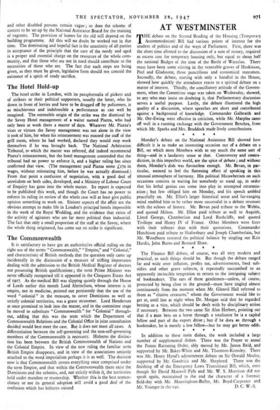AT WESTMINSTER
THE debate on the Second Reading of the Housing (Temporarj Accommodation) Bill had various points of interest for tha student of politics and of the ways of Parliament. First, there was the short time allotted to the discussion of a sum of money, required as excess cost for temporary housing only, but equal to about half the national Budget of the time of the Battle of Waterloo. There must have been some stirring in the venerable graves of Huskisson, Peel and Gladstone, those punctilious and economical statesmen. Secondly, the debate, starting with only a handful in the House, showed how quickly the attendance reacts to a spirited debate on a matter of interest. Thirdly, the conciliatory attitude of the Govern- ment, when the Committee stage was taken on Wednesday, .showed, to any who may insist on doubting it, that Parliamentary discussion serves a useful purpose. Lastly, the debate illustrated the high quality of a discussion, where speeches are short and contributed against a background of knowledge. Commander Galbraith and Mr. Orr-Ewing were effective in criticism, while Mr. Maples came off well in a running exchange with the Government Benches, from which Mr. Sparks and Mrs. Braddock made lively contributions.
• * * * Monday's debate on the National Assistance Bill showed how difficult it is to make an interesting occasion out of a debate on a Bill, on which most Members wish to say much the same sort of thing—and in a laudatory sense at that. Controversy and contra- diction, in this imperfect world, are the spice of debate ; and without them, Monday's dish was flavourless enough. Mr. Bevan, in par- ticular, seemed to feel the flattening effect of speaking in this unusual atmosphere of harmony. His political Micawberism on such occasions consists in waiting for somebody to stand up, in order that his lethal genius can come into play in attempted extermin- ation ; but few obliged him on Monday, and his speech ambled peacefully on. Mr. Elliot's larger historical sense and far-ranging mind enabled him to be rather more successful in a debate resonant with the echoes of history. Mr. Bevan paid tribute to the Webbs, and quoted Milton. Mr. Elliot paid tribute as well to Asquith, Lloyd George, Chamberlain and Lord Rushcliffe, and quoted Trollope and Henry IV of France. Other Members were freer with their tributes than with their quotations. Commander Hutchison paid tribute to Shaftesbury and Joseph Chamberlain, but Mr. Woodburn restored the political balance by singling out Keir Hardie, John Burns and Bernard Shaw. * * * * The Finance Bill debate, of course, was all very modern and practical, as such things should be. But though the debate ranged far and wide over inflation, profits tax, advertisements, food sub- sidies and other grave subjects, it repeatedly succumbed to an apparently invincible temptation to return to the intriguing subject of bookmakers. The ears of these gentlemen—unless, of course, protected by being close to the ground—must have tingled almost continuously from the moment when Mr. Glenvil Hall referred to them as " elusive creatures," whom the Government would like to get at, until late at night when Dr. Morgan said that he regarded betting as a vice, which should be dealt with by disciplinary action if necessary. Between the two came Sir Alan Herbert, pointing out that if a man bets on a horse through a totalisator he is a capital fellow and part of the export drive ; but if he does so through a bookmaker, he is merely a low fellow—but he may get better odds. * * * * In addition to these main dishes, the week included a large number of supplemental dishes. There was the Prayer to annul the Potato Rationing Order, ably moved by Mr. James Reid, and supported by Mr. Baker-White and Mr. Thornton-Kemsley. There was Mr. Henry Hynd's adjournment debate on Sir Oswald Mosley, supported by Mr. Goodrich and Mr. Shepherd. There was the finishing off of the Emergency Laws Transitional Bill, which, even though Sir David Maxwell Fyfe and Mr. W. S. Morrison did not speak again, maintained to the end the character of a forensic field-day with Mr. Manningham-Buller, Mr. Boyd-Carpenter and




























 Previous page
Previous page